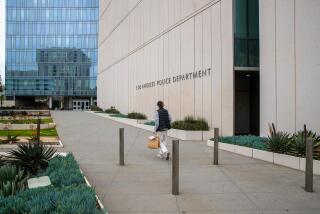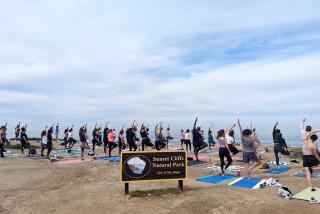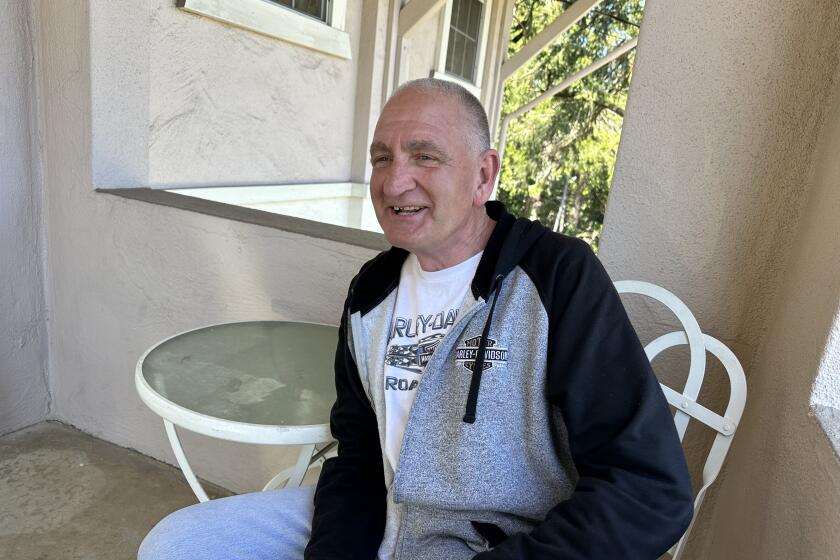Doctors, Victims Interviewed : Investigator Tracks AIDS Trail for Long Beach
Doctors view her with suspicion; patients have slammed doors in her face.
Marla Judd is the city’s first AIDS “surveillance consultant.” Her job is to confirm AIDS diagnoses with doctors and then interview the patients--if they are still alive and healthy enough to talk--asking pointed questions about their sex lives or drug habits.
Her purpose is to gather information about AIDS victims in Long Beach that might shed light on how the disease is contracted and transmitted, she said.
Her visits to doctors, Judd admitted, are “probably just the last thing they want.” But, as might be expected, calling on a patient is even tougher.
The doctors “are already exhausted from seeing the patients. . . . It’s frustrating to people who like to make a sick person healthy,” Judd said, adding that doctors are usually reticent because of concerns about patients’ confidentiality.
Patients can be even tougher to interview, Judd said. Some patients are hostile, others are in shock or deny that they have the disease. Some patients are so bitter about having acquired immune deficiency syndrome that they say they plan to continue unsafe sex and drug practices, regardless of the risk to others, Judd said.
She said she understands the hostility.
“They are angry, they’re scared, they’re going to die soon,” she said. “My personal feeling is back off and give them a break.”
Judd said that, without making any judgments, she attempts to provide information on safe sex and drug practices or recommend counseling services provided through The Center/Long Beach, one of the first AIDS screening facilities in the nation.
Also Judd tries to determine how someone may have contracted AIDS, and who may have been exposed to the virus. When that can be determined, she follows the trail.
“We cannot be policemen, we cannot force people to change their personal habits. We can only hope that they would do that out of love for mankind,” she said.
Judd was hired last month by the City Council as part of the city’s mushrooming AIDS program. The effort, which began with a $15,000 state grant for AIDS education in 1983, has grown to a program that will spend $875,000 in the 1986-87 fiscal year for free AIDS testing, education, seminars, support groups and counseling, said Ray Kincade, a registered nurse who coordinates the Center’s testing program with the city Health Department.
About $600,000 of this year’s funds come from the federal government, with the balance coming from the state.
Long Beach is one of two cities in the state that administers public health services through its own municipal health department, instead of relying on county health officials, Kincade said. The city historically has provided its own health services because of its dense population and distance from the city of Los Angeles, Kincade said. Pasadena is the other city that provides its own health services, Kincade said.
Under her contract with the city, Judd will earn $20,400 for a six-month period that ends June 30.
One of Judd’s grim tasks is to count the number of AIDS cases in Long Beach. According to figures she compiled last month, the city has had 144 confirmed AIDS cases, of which all but three are male.
According to Judd’s figures, of the 144 patients, 116 are Anglos, 19 are Latino, eight are black and one is Asian. Most of these AIDS patients--104 to be exact--are gay or bisexual while three say they used intravenous drugs. Five say they got AIDS through transfusions. Most patients are between the ages of 20 and 50, although one AIDS victim was a 1-year-old child, Judd said.
Half of these victims, including the child, have died, Judd said.
Long Beach AIDS patients, like those in Los Angeles, are predominantly bisexual or gay, she said. In the New York-New Jersey area, she said, drug users make up a higher proportion of the AIDS patients than in the Long Beach-Los Angeles area.
Some Reluctant to Answer
She said she has been able to interview fewer than half of the Long Beach patients, some of whom were unwilling to answer questions about their sex lives.
“I tell them I’m not going to be upset if they choose not to answer,” Judd said. “I would rather they said ‘I don’t want to answer that’ than give me false information.”
Not all AIDS cases are reported to health authorities, Judd said, adding that she believes she has learned of no more than 70% of the city’s AIDS cases. She said she understands that health professionals often suffer burnout when repeatedly treating AIDS patients, and is not surprised that they neglect to report some cases.
Judd, 36, first became interested in AIDS as a infection control nurse at St. Mary Medical Center in Long Beach. There, she said, she experienced the “emotional trauma” of AIDS patients and the fears of hospital staff members who were worried “about being exposed to this dreadful thing.” Health officials now say that AIDS can only be contracted through an exchange of bodily fluids or the use of contaminated needles.
“That whole picture just impressed me so,” she said, adding, “It made me that much more anxious to change the picture.”
More to Read
Start your day right
Sign up for Essential California for news, features and recommendations from the L.A. Times and beyond in your inbox six days a week.
You may occasionally receive promotional content from the Los Angeles Times.





